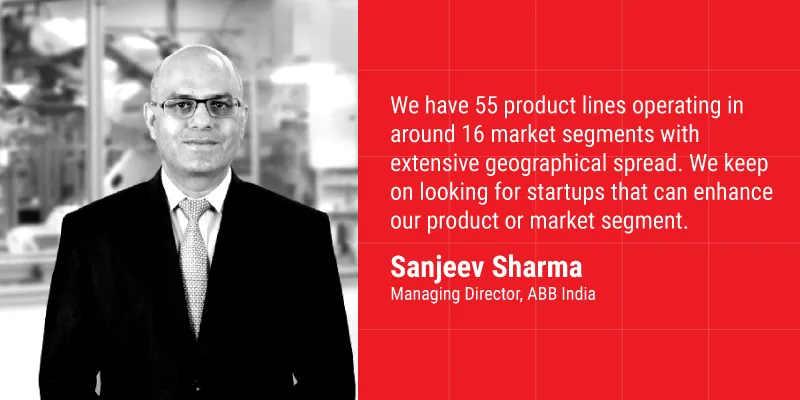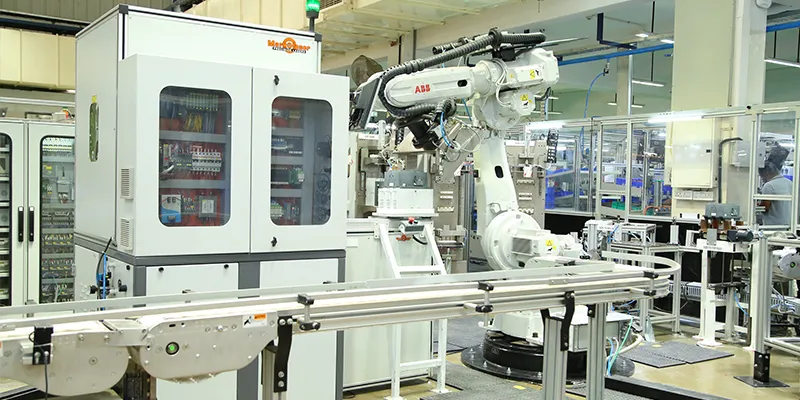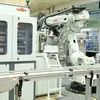Why industrial giant ABB is betting on Indian tech startups for a win-win relationship
ABB India wants to build strong linkages with technology startups in India, and is looking for innovative solutions that complement its product portfolio from these young companies .
It’s an old hand, but Swiss-Swedish MNC Asea Brown Boveri (ABB) is embracing the new. The Fortune 500 company, which operates mainly in the areas of robotics, power, heavy electrical equipment, and automation technology, is looking to form “mutually beneficial” relationships with young tech startups in India. The aim is one: help bring to market innovative solutions that complement ABB’s product portfolio.
“They (startups) cannot do what we do; we cannot do what they are doing. So we want to leverage them in the best possible manner,” says Sanjeev Sharma, Managing Director, ABB India.
A 130-year-old company, ABB has successfully managed various technology and business cycles. Today, in the age of internet and digital technologies, the driving force for the industrial giant is its big digitalisation push through ABB Ability, a unified, cross-industry digital offering — extending from device to edge to cloud — with “devices, systems, solutions, services and a platform that enable customers to know more, do more, do better, together”.
Scripting the future, together
ABB is now keen to leverage the expertise of startups in India in the areas it operates in. ABB Technology Ventures (ATV), the venture capital unit of the ABB group, was founded in 2009 to act as a bridge between young entrepreneurs and the company.
“The focus of ATV is to partner with breakthrough technology companies aligned with ABB’s goal to write the future of industrial digitalisation,” Sanjeev says.

The unit has invested more than $200 million into startups worldwide spanning a range of sectors such as robotics, drones, industrial IoT, AI/machine learning, cybersecurity, and distributed energy. As many as 21 investments have been made globally till now.
This engagement also complements the ABB Ability platform, as this a strong cross-industry digital solutions offering.
Startup connect example
Given this scenario, India – with its vibrant startup ecosystem - is very much part of ABB’s plan and the engagement is expected to strengthen further in the days to come. ABB also acts as mentor and is on the advisory committee of Industrial AI Consortium, a group was formed by AI startups, investors, and corporates to promote India as a global hub for industrial AI.
ATV has been active in India since 2016 and is constantly scouting the startup ecosystem, seeking out companies where ABB can set up meaningful partnerships.
Take the case of Stellapps, a technology startup founded by five IIT graduates in 2011. This company, with which ABB made its first investment in India, focuses on the dairy market, providing supply chain solutions. It taps into India’s $70 billion dairy market with its SmartMoo solution, which can track an animal’s health and yield through a wearable.
The Gujarat Cooperative Milk Marketing Federation Limited (GCMMF), better known to all of us for the brand Amul, is also an ABB customer. Process control systems at Amul are operated by ABB, but the biggest challenge it faced was regarding the quality of milk the GCMMF receives on a daily basis.
Now, through Stellapps technology, Amul is able to get accurate data on the quantity and quality of milk it procures, which is helping them create a predictive model that ensures a boost in productivity and efficiency.
“This is an example of a small idea that brings about change when integrated for the larger purpose,” Sanjeev says.
During the time of ABB’s investment into this startup in May, 2018, Stellapps CEO Ranjith Mukundan had said, “Stellapps is entering a stage of accelerating growth, and this strategic group of investment partners will be very valuable to scale our technology platform. We are excited to partner with ABB Technology Ventures and tap into ABB’s expertise and global reach for industrial automation solutions, particularly for food & beverage.”

ABB India's smart factory in Bengaluru
A long-term engagement
Sanjeev calls this a “mutual interdependency” where ABB either puts in a certain amount of investment into startups or they can become sub-suppliers for the industrial giant if the solution is suitable.
He adds, “We have 55 product lines operating in around 16 market segments with extensive geographical spread. We keep on looking for startups that can enhance our product or market segment.”
ABB has also taken various initiatives like bootcamps to make more startups a part of its programme. ATV also conducted its first “startup pitchfest” at the ABB Ability Innovation Centre in Bengaluru in 2018 with awards being given to the top participants.
“We tell what we do and give these platforms. This is done with the idea of imagining new products and services,” Sanjeev says.
This collaborative initiative, which also offers mentoring and guidance, sees participation of small and medium enterprises (SMEs) and startups from outside the country. In certain situations, business cases flow through where the solution from the SMEs or startups are integrated into their products.
Another example of this complementarity is with Climate-Connect, an energy management startup with offices in Netherlands and India. This startup has the technology to predict the amount of sunshine available in a day. “If one can connect that information to a solar plant, energy load management becomes easier,” says Sanjeev, adding that ABB has a range of solutions for the solar power industry.
ABB is also engaged with Exact Space, a Bengaluru based AI analytics solutions startup. They are working with ABB’s metals business to develop solutions pertaining to predicting failures in steel rolling mill, and works with the metals division.
ABB is keen to build strong linkages with the startup ecosystem in India as it “opens up numerous possibilities” where their products get enhanced and can “improve customer service”. “These relationships can be beneficial not just for a particular geography like India but also for our global market,” Sanjeev says.










